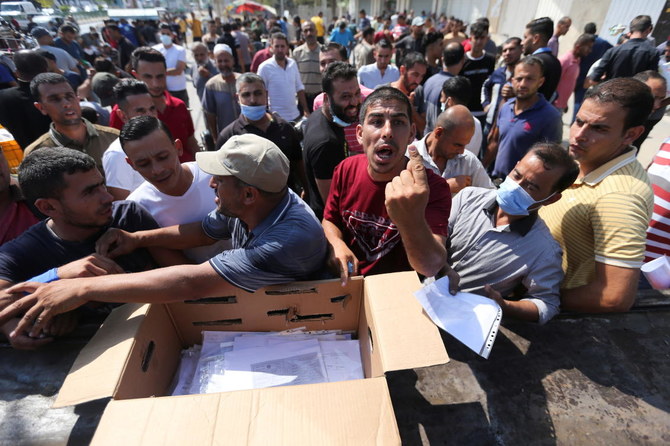GAZA CITY, Palestinian Territories: Thousands of Gazans applied Wednesday for work permits for Israel, which has been reopening its gates to laborers from the Palestinian enclave following the latest war in May.
In Jabalia, a refugee camp in northern Gaza, a crowd of men holding their identity papers lined up hoping to obtain a permit to work in Israel, AFP journalists said.
“There is no work in the Gaza Strip,” said Fathi Abu Nur, a 40-year-old unemployed man.
“Yesterday I heard that workers are registering to get permits (for Israel),” he said.
“I hope things will get better because the current situation is really difficult,” the father of five said.
The total number of permits being granted by Israel to Palestinian laborers in Gaza is 7,000, an Israeli security official told AFP, up from 5,000 workers and traders allowed in August.
In May, Israel and Hamas reached a truce following 11 days of the deadliest fighting in years.
Israel has since been easing restrictions on the Palestinian enclave, including reopening crossings, expanding the fishing zone and permitting the entry of certain goods.
Many Palestinians want to work in Israel, where wages are higher than in Gaza.
The impoverished territory of two million inhabitants with an unemployment rate of about 50 percent has been blockaded by Israel for nearly 15 years.
Palestinian economic analyst Omar Shaaban said Israeli work permits could help alleviate “the unemployment crisis and poverty” within the territory, ruled by the Islamist movement Hamas.
According to Shaaban, Gaza’s income would increase by three million dollars per day ($3 million), if Israel granted 20,000 work permits.
Meanwhile, the increase in permits was “the result of a political process, including discussions in Cairo between the Hamas movement and Egyptian officials,” a Palestinian official at the chamber of commerce said on condition of anonymity.
Israeli Foreign Minister Yair Lapid has put forth a plan to improve living conditions in Gaza in exchange for a Hamas commitment to “long-term quiet.”
Israel and Hamas have fought four wars since 2008.
Thousands of Gazans apply for Israeli work permits
https://arab.news/4n77k
Thousands of Gazans apply for Israeli work permits

- In Jabalia, a crowd of men holding their identity papers lined up hoping to obtain a permit to work in Israel, AFP journalists said
- The total number of permits being granted by Israel to Palestinian laborers in Gaza is 7,000
Palestinian technocrats who will run Gaza hold their first meeting in Cairo

- Committee made up of 15 technocrats charged with administering everyday life in the Palestinian territory
CAIRO: The Palestinian committee that will govern postwar Gaza held its first meeting in Cairo on Friday.
Formed on Wednesday as the second phase of the US-brokered Gaza ceasefire deal came into effect, the committee is made up of 15 technocrats charged with administering everyday life in the Palestinian territory.
The meeting followed US President Donald Trump’s declaration of the formation of a Gaza “board of peace,” a key phase two element of the US-backed plan to end the war.
Members of the board will be announced shortly, Trump said, and he will chair it. “I can say with certainty that it is the Greatest and Most Prestigious Board ever assembled at any time, any place,” he said.
The peace plan also calls for the deployment of an International Stabilisation Force to help secure Gaza and train vetted Palestinian police units.
“The ball is now in the court of the mediators, the American guarantor and the international community to empower the committee," senior Hamas leader Bassem Naim said.
The US-backed Gaza peace plan first came into force on October 10, facilitating the return of all the hostages held by Hamas and an end to the fighting between the Palestinian militant group and Israel in the besieged territory.
The plan's second phase is now underway, though clouded by ongoing allegations of aid shortages and violence. Israeli forces have killed 451 Palestinians since the ceasefire began.














